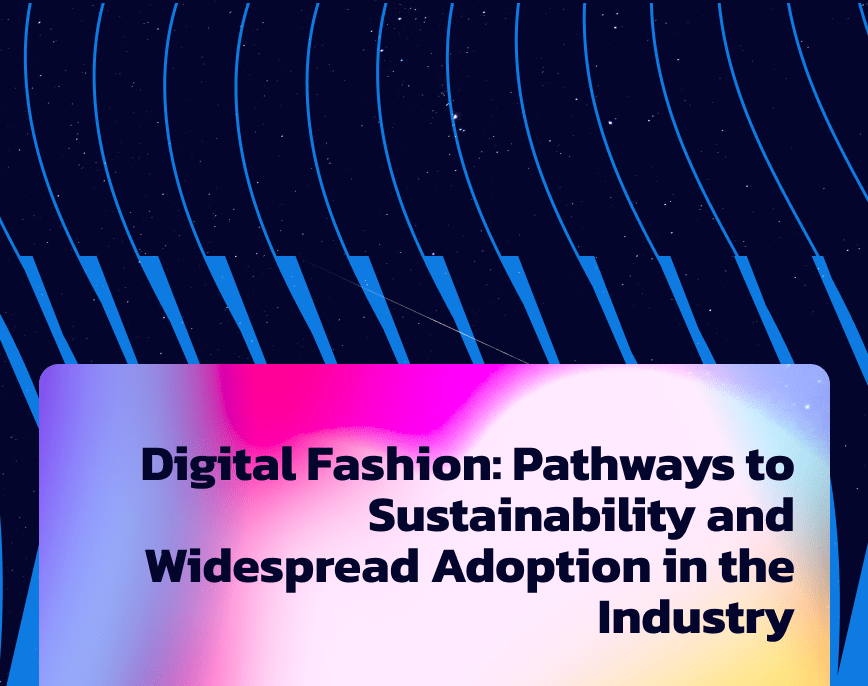Digital Fashion: Mainstream Adoption and Use Cases for a More Sustainable Industry
Written by
Krista Alvarez
Published on
January 31, 2024
Time reading
3 minutes

In a world where constant evolution is the norm, so too does our expression through fashion evolve. As we actively pursue sustainability in every facet of our lives, the fashion industry stands as no exception to this trend. A groundbreaking innovation making waves in the fashion world is Digital Fashion, a concept that not only embraces technological advancements but also significantly contributes to the creation of a more sustainable and eco-friendly industry.
The Rise of Digital Fashion
Digital Fashion is the creation of clothing and accessories existing solely in the digital realm, challenging traditional norms by eliminating the need for physical production, reducing waste, and promoting sustainability. As technology advances, digital fashion becomes more accessible, gaining mainstream acceptance.
Statistics:
- Global Awareness: A recent survey by Fashion Revolution indicates that 78% of respondents believe the fashion industry needs to become more sustainable, with digital fashion emerging as a key player in achieving this goal.
- Market Growth: According to a report by Grand View Research, the digital fashion market is projected to grow at a CAGR of 27.4% from 2021 to 2028.
- Environmental Impact: A study by McKinsey & Company reveals that the fashion industry is responsible for 4% of the world’s waste annually. Digital fashion has the potential to significantly reduce this environmental footprint.
Use Cases of Digital Fashion
- Virtual Fashion Shows: Digital fashion transforms the way we experience fashion shows. Designers can showcase collections in virtual spaces, reaching a global audience without the need for physical events. This reduces carbon emissions and minimizes the environmental impact of traditional runway shows.
- Customization and Personalization: Consumers increasingly seek personalized experiences. Digital fashion allows users to customize clothing virtually, reducing impulse buying and the likelihood of returns, thereby cutting down on unnecessary shipping and production waste.
- NFTs and Digital Ownership: Non-fungible tokens (NFTs) have entered the fashion scene, enabling digital ownership of unique items. This not only provides a new revenue stream for designers but also reduces the demand for physical production, fostering a more sustainable approach to fashion consumption.
- Digital Fashion in E-Commerce: The rise of digital fashion is reshaping online retail, enhancing the online shopping experience, and reducing the likelihood of returns, contributing to a more sustainable e-commerce model.
- Educational Initiatives and Sustainability Awareness: Digital fashion opens avenues for educational initiatives focused on sustainable practices within the industry. These initiatives can drive positive change and foster a collective commitment to sustainable fashion practices.
Mainstream Adoption of Digital Fashion: A Paradigm Shift in Consumer Behavior
As digital fashion continues to redefine the fashion landscape, its mainstream adoption signifies a paradigm shift in consumer behavior and industry practices. This transformative trend reshapes the way people perceive, interact with, and consume fashion, presenting opportunities for sustainability and innovation.
- The Shift Towards Digital Closets: Consumers increasingly embrace digital closets, reducing the demand for physical clothing items and encouraging a more conscious and sustainable approach to personal style.
- Celebrity Endorsement and Social Media Impact: Celebrities and influencers play a crucial role in driving fashion trends. The adoption of digital fashion by high-profile individuals and its promotion on social media platforms contribute significantly to its mainstream acceptance.
- Inclusive Fashion for All Body Types: Digital fashion breaks down traditional barriers related to size and body representation, promoting inclusivity and challenging exclusive standards set by traditional fashion.
- Corporate Sustainability Initiatives: Major fashion brands and retailers recognize the importance of sustainable practices and are integrating digital fashion into their strategies, contributing to its normalization within the industry.
Finale
Digital fashion’s mainstream adoption represents not just a technological advancement but a cultural and environmental revolution. As consumers, influencers, and industry leaders collectively embrace this digital frontier, the potential for a more sustainable and inclusive fashion industry becomes increasingly attainable.
The statistics affirm a growing awareness and acceptance, marking a pivotal moment in the evolution of fashion towards a more digital, sustainable, and consumer-centric future. Let’s continue to support and explore these transformative technologies with Visible Magic!